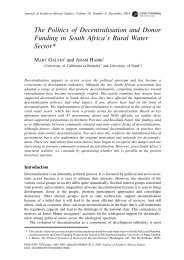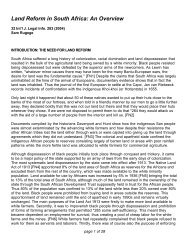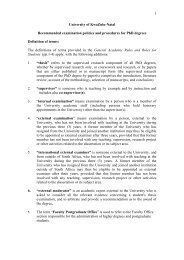Bell, Trevor : Unemployment in South Africa
Bell, Trevor : Unemployment in South Africa
Bell, Trevor : Unemployment in South Africa
You also want an ePaper? Increase the reach of your titles
YUMPU automatically turns print PDFs into web optimized ePapers that Google loves.
equilibrium situation, reached eventually after a long period of<br />
adjustment. Say after adjustment to the deflationary shock,<br />
<strong>in</strong>dividuals vho vould have othervise have been offered and vould have<br />
accepted jobs, decl<strong>in</strong>e <strong>in</strong>ferior jobs because they consider it<br />
unsuited to their ability, because it entails shift-vork, because<br />
transport costs are too high, because it is too far avay, or, <strong>in</strong> the<br />
case of homelands dvellers, because the return to vork<strong>in</strong>g the land<br />
vas simply not considered vorth the effort. Should such vorkers be<br />
regarded as underemployed, voluntarily unemployed or <strong>in</strong>voluntarily<br />
unemployed7 A prevalent viev is that the vorker is voluntarily<br />
unemployed and that this is therefore not a problem of unemployment.<br />
Our description of this case, hovever, shovs that even such an<br />
<strong>in</strong>crease <strong>in</strong> voluntary unemployment represents a deterioration <strong>in</strong> the<br />
community's vell-be<strong>in</strong>g, and that contrary to the impression the term<br />
"voluntary" gives, represents a real social problem orig<strong>in</strong>at<strong>in</strong>g <strong>in</strong> a<br />
decl<strong>in</strong>e <strong>in</strong> the availability of employment1). Thus ris<strong>in</strong>g longrun<br />
unemployment rates, vhether seen as <strong>in</strong>voluntary, or as <strong>in</strong>volv<strong>in</strong>g<br />
a ris<strong>in</strong>g natural rate of unemployment, and therefore voluntary, may<br />
represent a real social problem of unemployment. Whether ve choose<br />
to label it 'voluntary' or '<strong>in</strong>voluntary', therefore, is irrelevant.<br />
In current economic conditions, and tak<strong>in</strong>g <strong>in</strong>to account the basic<br />
underly<strong>in</strong>g forces br<strong>in</strong>g<strong>in</strong>g it about, a ris<strong>in</strong>g <strong>in</strong>dex of unemployment<br />
reflects a problem vhich may perfectly reasonably be called a problem<br />
of unemployment2).<br />
1) We may, therefore, perhaps equally appropriately call it a problem of<br />
"employment" rather than one of "unemployment". What is essential,<br />
hovever, is that vhichever term ve use a ris<strong>in</strong>g unemployment rate<br />
repreaents the vorsen<strong>in</strong>g of a real social problem.<br />
2) It might be noted that, vith very fev exceptions, economists <strong>in</strong> the<br />
advanced <strong>in</strong>dustrial countries, do not deny that unemployment rates<br />
have risen or that this represents a vorsen<strong>in</strong>g situation. Indeed<br />
even monetarists abroad generally concede that the <strong>in</strong>crease largely<br />
represents <strong>in</strong>voluntary unemployment. The ma<strong>in</strong> disagreement has been<br />
over hov lonq-last<strong>in</strong>g the <strong>in</strong>crease is likely to be.

















